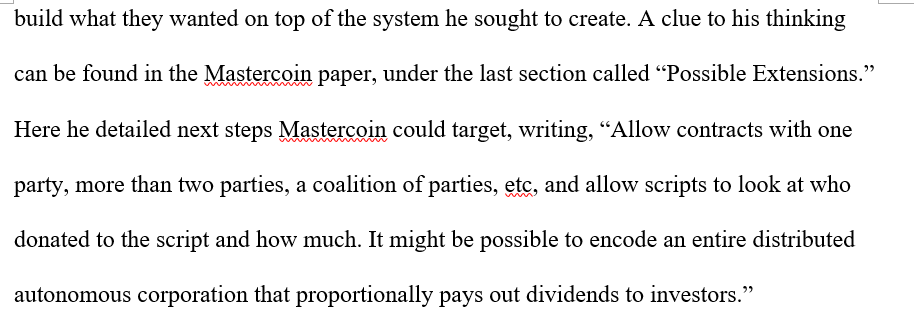the Alchemy story I did today is a great way of explaining why #Ethereum is different from #Bitcoin  https://abs.twimg.com/hashflags... draggable="false" alt=""> by design, as the last week has shown not many people know the ETH genesis story. I& #39;ve spent the last year and a half working on the genesis so
https://abs.twimg.com/hashflags... draggable="false" alt=""> by design, as the last week has shown not many people know the ETH genesis story. I& #39;ve spent the last year and a half working on the genesis so
a thread https://www.bloomberg.com/news/articles/2020-08-11/jay-z-charles-schwab-backed-ethereum-app-opens-doors-to-public?sref=GOaqpa8R">https://www.bloomberg.com/news/arti...
a thread https://www.bloomberg.com/news/articles/2020-08-11/jay-z-charles-schwab-backed-ethereum-app-opens-doors-to-public?sref=GOaqpa8R">https://www.bloomberg.com/news/arti...
@VitalikButerin loved Bitcoin is the beginning of this story. It captured his imagination and combined all the things he cherished -- math, cryptography, programming and economics. He set out to earn it by writing about it, first at a blog then at Bitcoin Magazine
while he loved how Bitcoin enabled trustless value transactions to be sent anywhere in the world, like a lot of devs Vitalik soon wanted to know if BTC could do more. He wanted to push what a global distributed network of computers could accomplish
he started by working with the Colored Coins team in 2013 and co-wrote the BitcoinX white paper with Yoni Assia, Lior Hakim, Meni Rosenfeld and Rotem Lev https://docs.google.com/document/d/1AnkP_cVZTCMLIzw4DvsW6M8Q2JC0lIzrTLuoWu2z1BE/edit">https://docs.google.com/document/...
Like many in 2013, they wanted to use the underlying blockchain to move assets other than BTC. To do that, they’d create “an overlay network of issuance of distinct instruments encapsulated in a design we call & #39;colored coins& #39;” as the paper says.
Yet another project, Mastercoin, had emerged at this time, and Vitalik knew right away it held more potential than a colored coins project for expanding Bitcoin& #39;s capabilities.
he wrote another white paper examining Mastercoin& #39;s features and suggesting changes to its structure
https://web.archive.org/web/20150527194453/http://vbuterin.com/ultimatescripting.html">https://web.archive.org/web/20150...
https://web.archive.org/web/20150527194453/http://vbuterin.com/ultimatescripting.html">https://web.archive.org/web/20150...
he sent the paper to the Mastercoin folks, who said "meh." Also, when he got into the Mastercoin code he realized all of it needed to be replaced for what he wanted to do. And here, at the end of the MC paper, we can see a spark of #Ethereum:
as you can see, Vitalik went deep into the guts of Bitcoin to explore all that could be done with it.
Yet once he got the cold shoulder from the Mastercoin team, Vitalik knew he had to build something on his own to realize his vision. but what vision? He wanted a programmable blockchain to allow devs and creators to build whatever they wanted on top of it
by November 2013 Vitalik was in San Francisco, staying at the spare apartment of Jesse Powell. His vision for a programmable blockchain had cemented in his mind, but he needed a way to require a small amount of crypto to be spent for every transaction to be processed
he called it "gas" at first and this is where ether was born. once he had this worked out he wrote the Ethereum white paper in two weeks
so the basis of Ethereum is ether, which is required for the ETH blockchain to process txns. like a car, no gas, no go. Ether was never meant to be money, it was meant to be the lubricant for this new and vastly more powerful blockchain
of course, since you need to own ether to engage with smart contracts ether would always have a value, the true value of Ethereum however, is the decentralized apps that run on it
That& #39;s why today we see a startup like @AlchemyPlatform that& #39;s providing the dev tools to fuel 70% of the dapps on Ethereum, a firm that could be a billion dollar breakout in defi, and that& #39;s *only* from providing the building blocks to defi projects
Bitcoin does one thing and does it extremely well. Ethereum wants to do everything else and so far has had mixed results. But the growing defi community seems to be showing that the next wave of Ethereum evolution is here
There will be blowups and hacks and thefts as there always have been in crypto, but out of the ashes of a mostly failed ICO boom in 2017/18 real projects are now live on Ethereum
@decentraland and @cryptovoxels are two amazing digital worlds being constructed entirely on the Ethereum blockchain; there are so many more great projects too
this was always the plan, what Vitalik wanted to create for the rest of the world to then build upon. It seems a waste of effort to try to say only Bitcoin or only Ethereum should exist, they can both exist and really don& #39;t have too much in common beyond their blockchain mechanic
that& #39;s it, I hope this helps to give a sense of history to new people entering crypto now or for those who had never heard these stories and to maybe shed some light on why twitter wars between #BTC  https://abs.twimg.com/hashflags... draggable="false" alt=""> and #ETH folks erupt from time to time
https://abs.twimg.com/hashflags... draggable="false" alt=""> and #ETH folks erupt from time to time

 Read on Twitter
Read on Twitter


